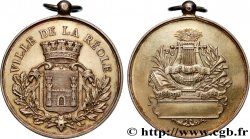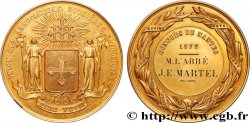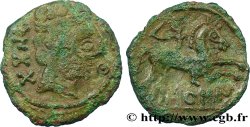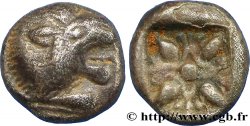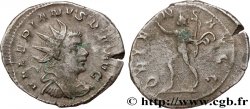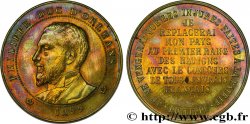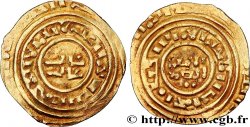fme_479324 - TERCERA REPUBLICA FRANCESA Médaille de propagande
No disponible.
Artículo vendido en nuestra tienda (2019)
Precio : 30.00 €
Artículo vendido en nuestra tienda (2019)
Precio : 30.00 €
Tipo : Médaille de propagande
Fecha: 1899
Nombre del taller / ciudad: France
Metal: latón dorado
Diámetro: 30,5 mm
Eje de acuñación: 12 h.
Peso: 7,92 g.
Canto: Lisse
Comentarios sobre el estado de conservación:
Aspect nettoyé. Traces de manipulations et rayures dans les champs
Anverso
Titulatura del anverso: PHILIPPE DUC D’ORLÉANS / (COURONNE) 1899 (COURONNE).
Descripción del anverso: Buste à gauche. .
Reverso
Titulatura del reverso: JE NE VENGERAI QUE LES INJURES FAITES Å LA PATRIE - PHILIPPE // JE / REPLACERAI / MON PAYS / AU PREMIER RANG / DES NATIONS / AVEC LE CONCOURS / DE TOUS LES VRAIS / FRANÇAIS.
Descripción del reverso: Légende circulaire et en 8 lignes horizontales.
Comentario
Il existe une autre version très proche datée 1900 et une autre variée et datée de 1909 avec la formule Tout ce qui est national est nôtre.
Philippe, duc d'Orléans est surtout resté dans l'Histoire pour être retourné en France, en 1890, bravant ainsi les lois d'exil qui, depuis 1886, tenaient la famille royale éloignée. Arrêté après s'être présenté au bureau de recrutement de Paris pour faire son service militaire (ce qui lui valut le surnom de "prince gamelle"), il fut condamné à deux années d'emprisonnement et expulsé. Prétendant au trône de France depuis la mort de son père, en 1894, il vécut l'essentiel de sa vie en Angleterre. Marié en 1896 à l'archiduchesse Marie-Dorothée d'Autriche, il mourut sans descendance en 1926. Ses droits dynastiques passèrent alors à son cousin Jean, duc de Guise, père du Prince Henri d'Orléans.
Cf. http://www.musee-orsay.fr/fr/evenements/expositions/archives/presentation-generale/browse/12/article/photographies-de-philippe-duc-dorleans-4189.html?tx_ttnews[backPid]=252&cHash=70b983c279 ).
There is another very similar version dated 1900 and another varied one dated 1909 with the formula Everything that is national is ours. Philippe, Duke of Orléans, is remembered above all for having returned to France in 1890, thus defying the exile laws which, since 1886, had kept the royal family at a distance. Arrested after presenting himself at the Paris recruitment office to do his military service (which earned him the nickname \\\"Prince Gamelle\\\"), he was sentenced to two years of imprisonment and expelled. A pretender to the throne of France since the death of his father in 1894, he lived most of his life in England. Married in 1896 to Archduchess Maria Dorothea of Austria, he died without issue in 1926. His dynastic rights then passed to his cousin Jean, Duke of Guise, father of Prince Henri of Orléans. See http://www.musee-orsay.fr/fr/evenements/expositions/archives/presentation-generale/browse/12/article/photographies-de-philippe-duc-dorleans-4189.html?tx_ttnews[backPid]=252&cHash=70b983c279)
Philippe, duc d'Orléans est surtout resté dans l'Histoire pour être retourné en France, en 1890, bravant ainsi les lois d'exil qui, depuis 1886, tenaient la famille royale éloignée. Arrêté après s'être présenté au bureau de recrutement de Paris pour faire son service militaire (ce qui lui valut le surnom de "prince gamelle"), il fut condamné à deux années d'emprisonnement et expulsé. Prétendant au trône de France depuis la mort de son père, en 1894, il vécut l'essentiel de sa vie en Angleterre. Marié en 1896 à l'archiduchesse Marie-Dorothée d'Autriche, il mourut sans descendance en 1926. Ses droits dynastiques passèrent alors à son cousin Jean, duc de Guise, père du Prince Henri d'Orléans.
Cf. http://www.musee-orsay.fr/fr/evenements/expositions/archives/presentation-generale/browse/12/article/photographies-de-philippe-duc-dorleans-4189.html?tx_ttnews[backPid]=252&cHash=70b983c279 ).
There is another very similar version dated 1900 and another varied one dated 1909 with the formula Everything that is national is ours. Philippe, Duke of Orléans, is remembered above all for having returned to France in 1890, thus defying the exile laws which, since 1886, had kept the royal family at a distance. Arrested after presenting himself at the Paris recruitment office to do his military service (which earned him the nickname \\\"Prince Gamelle\\\"), he was sentenced to two years of imprisonment and expelled. A pretender to the throne of France since the death of his father in 1894, he lived most of his life in England. Married in 1896 to Archduchess Maria Dorothea of Austria, he died without issue in 1926. His dynastic rights then passed to his cousin Jean, Duke of Guise, father of Prince Henri of Orléans. See http://www.musee-orsay.fr/fr/evenements/expositions/archives/presentation-generale/browse/12/article/photographies-de-philippe-duc-dorleans-4189.html?tx_ttnews[backPid]=252&cHash=70b983c279)








 Informar de un error
Informar de un error Imprimir la página
Imprimir la página Comparte mi selección
Comparte mi selección Haz una pregunta
Haz una pregunta Consignar / vender
Consignar / vender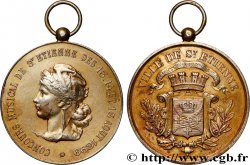
 Descriptivo
Descriptivo